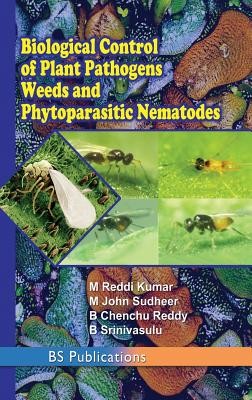
- We will send in 10–14 business days.
- Author: M Reddi Kumar
- Publisher: Bsp Books Pvt. Ltd.
- ISBN-10: 9352300645
- ISBN-13: 9789352300648
- Format: 15.6 x 23.4 x 1.4 cm, hardcover
- Language: English
- SAVE -10% with code: EXTRA
Biological Control of Plant Pathogens Weeds and Phytoparasitic Nematodes (e-book) (used book) | bookbook.eu
Reviews
Description
Traditionally plant diseases have been managed by the use of toxic chemicals. However, concern increases due to their hazard effects directly or indirectly on the life of man and animals. Non-judicious use of chemicals leads to increase in pathogens resistance. Therefore, the alternatives to chemicals control such as resistant varieties, cultural practices and biological control have become essential for the management of plant diseases and crop production. Biological methods mainly consist of using microorganisms to control harmful microorganisms causing plant diseases without disturbing the ecological balance. Biological control of plant pathogens continuous to inspire research and development in many fields.
Biological control of weeds is defined as the use of natural enemies to exert pressure on the population of their host plants to reduce them. Most of the programmes on biocontrol of weeds have been carried out by entomologists, who have introduced phytophagous insects from the native region of a weed to another geographical area.
In short, it appears that plant pathogens as biological control agents hold a good promise. Although they are not expected to replace chemicals, which will dominate the market for many more years to come, their integration with chemicals should find an important place in weed management technology.
The book caters to the needs of students, teachers and research scholars who are pursuing biological control studies.
Features
- Techniques related to extraction of plant parasitic nematodes explained
- Approaches to biological suppression of weeds with pathogens explored
- An overview of post-harvest diseases of fruits provided
- Mass production of Trichoderma Spp. explained
- Efficiency of the pathogens for weed control discussed.
EXTRA 10 % discount with code: EXTRA
The promotion ends in 20d.07:26:16
The discount code is valid when purchasing from 10 €. Discounts do not stack.
- Author: M Reddi Kumar
- Publisher: Bsp Books Pvt. Ltd.
- ISBN-10: 9352300645
- ISBN-13: 9789352300648
- Format: 15.6 x 23.4 x 1.4 cm, hardcover
- Language: English English
Traditionally plant diseases have been managed by the use of toxic chemicals. However, concern increases due to their hazard effects directly or indirectly on the life of man and animals. Non-judicious use of chemicals leads to increase in pathogens resistance. Therefore, the alternatives to chemicals control such as resistant varieties, cultural practices and biological control have become essential for the management of plant diseases and crop production. Biological methods mainly consist of using microorganisms to control harmful microorganisms causing plant diseases without disturbing the ecological balance. Biological control of plant pathogens continuous to inspire research and development in many fields.
Biological control of weeds is defined as the use of natural enemies to exert pressure on the population of their host plants to reduce them. Most of the programmes on biocontrol of weeds have been carried out by entomologists, who have introduced phytophagous insects from the native region of a weed to another geographical area.
In short, it appears that plant pathogens as biological control agents hold a good promise. Although they are not expected to replace chemicals, which will dominate the market for many more years to come, their integration with chemicals should find an important place in weed management technology.
The book caters to the needs of students, teachers and research scholars who are pursuing biological control studies.
Features
- Techniques related to extraction of plant parasitic nematodes explained
- Approaches to biological suppression of weeds with pathogens explored
- An overview of post-harvest diseases of fruits provided
- Mass production of Trichoderma Spp. explained
- Efficiency of the pathogens for weed control discussed.


Reviews